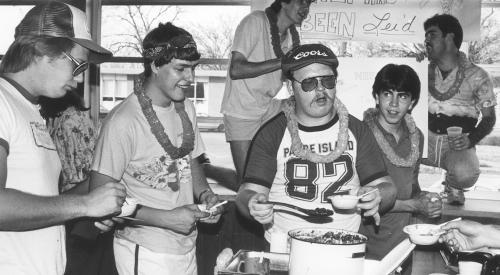|
When Jason Swaner began selling condos at Texas & Pacific Lofts, an urban reuse project in a historic railroad station in downtown Fort Worth, Texas, he encountered a challenge. Swaner, a new home sales consultant for CondoSmart, the selling agent for T&P Lofts, had never before sold homes with a homeowners' association. He found himself faced with overcoming the same objection over and over: the added expense of .38 per square foot per year in HOA dues. This sometimes meant an extra $500 to $600 added to the mortgage.
"I knew I had to turn it into a features-and-benefits scenario," says Swaner, whose team has successfully sold 120 out of 136 condos in the project since 2006. He now puts a dollar amount on all the services that the HOA dues will include, such as cable TV and Internet. "There's already one bill you don't have to pay," he tells prospects. Then he explains the 24/7 concierge service, workout facility and maintenance of the common areas. He tells prospects, "If you live in a sharp and clean property, that adds value to your home. And if you go to sell it in five years, this is maintaining appreciation over time.
"Once they understand all that," says Swaner, "they usually agree that they will actually come out even or way ahead."
Bob Schultz, president of The New Home Specialists in Boca Raton, Fla., echoes the success of this strategy. "That which we can't perceive, we don't give value to," says Schultz. "It's all about turning an intangible into a tangible and then connecting it with an emotion."
There's perhaps nothing more emotional for people right now than the high price of gasoline. Swaner uses the opportunity to sell the dry cleaning drop-off and pick-up service the concierge provides. He tells prospects, "With the rising cost of gas, you want to make as few trips as possible. Two or three trips a week can really add up."
The tie-downBonnie Alfriend, president of Alfriend Sales and Marketing Solutions in Pebble Beach, Calif., agrees with outlining benefits and believes salespeople need to go one step further. "I find that salespeople are generally good about explaining benefits, but are not so good at getting them to 'buy in.'" When touting a builder's services such as a warranty, she recommends saying: "This warranty will keep your home from obsolescence and maintain value for a period of time. Is that something you would like for your new home?" She adds, "We sell a home in bite sizes, and getting that agreement is just one of the bites."
 |
|
Weiss Homes in Indiana tous its "one-stop shop" through prominent displays in sales offices. |
From some builders, such as Weiss Homes in South Bend, Ind., success is all about selling bundled services. Ted Uelk, community manager of Weiss, says the builder's one-stop shop concept includes an in-house mortgage company, state-of-the-art design studio, excellent warranty program and, for the prospect with a home to sell, a full-service, low-commission realty brokerage. "Our value is truly in the total package," he says.
The company's design studios have made a name for themselves in the South Bend area, as Weiss is the only area builder that offers them. The firm created them two years ago in an attempt to differentiate itself from the competition. But how do salespeople communicate the value of it to prospects? Weiss' salespeople follow a consistent system of demonstrating the home, then describing the 24/7 design studio,"established for the convenience of the buyer," Uelk says. "They point out the time and money savings, mentioning how they don't have to run all over town, hoping everything matches at the end."
But what if a prospect turns up his or her nose at one of the services in the package? Take the customer who insists that he or she doesn't need the design center, either because he or she already has firm design ideas or, "there's a sister-in-law who's a designer," says Alfriend. She recommends using the following: "Wow, that's terrific! Feel free to bring her, and we have already done a lot of the homework for her. Our specially trained designers have narrowed down some of the best products and cutting-edge designs for your home, assuring it is fresh and new for years to come. And it doesn't cost you any extra. How does that work for you?"
Uelk adds, "HGTV has created a lot of 'experts,' so our salespeople spend time educating customers that instead of moving in and having work to do, they can move in an immediately enjoy the home."
Overcoming objectionsKeep objections to a minimum by personalizing your presentation, says Melinda Brody, president of Melinda Brody and Co. in Orlando, Fla., who conducts sales training and video shopping. "Always ask customers what's important to them rather than immediately launching into a long explanation about your fabulous design center," she says. "Sometimes the customer becomes checked out mentally because the speech starts to sound like a time share presentation."
Brody recommends determining customers' needs and wants by asking deeper questions as a part of the greeting and qualifying process. This ensures you won't waste their time explaining services they're not interested in. Questions such as, "What do you like to do in your spare time?" "Do you work out?" "Do you have pets?" and "Tell me about your family," will help the salesperson determine whether to emphasize the clubhouse, the exercise facilities, the pool or the dog park.
Weiss' Uelk agrees. "We don't just dump information on them; we get them involved. We ask, 'Will you be paying cash or financing?' That determines whether they need to know about our mortgage services." Likewise, "'Do you have a home to sell?' tells us whether or not they need Weiss Realty."
 |
| Centex Homes in southeast Florida differentiates itself in the marketplace by offering a warranty twice as long as most of its competitors. |
"Most people don't understand warranties," admits Schultz. One way to win in this area is to find the point of differentiation, and position it like this: "We are the only builder that provides . . ." then outline the benefits. He points out that the operative words to use are "insured" and "included." And, he says, it doesn't hurt to add, "We do it because we believe it's the right thing to do."
Centex's southeast Florida division differentiates itself from its competitors by offering a two-year warranty on workmanship and materials, twice what other builders in the area offer. But Richard Elkman, president of Group Two Advertising in Delray Beach, Fla., whose firm designed Centex's ads touting the warranty, stresses that a builder can't compete on a warranty alone but also must successfully position product, location and amenities.
Tracy Gundersen, CEO of Warranty Management Technologies, believes that the better the salesperson educates the buyer on the warranty process, the higher the customer satisfaction rate. The salesperson should explain that there is no such thing as a defect-free home but that the warranty department's policy is to respond to problems within X days. "Companies who do a fantastic job with how to sell their warranties as a benefit are comfortable saying: We know there are going to be issues; we're going to talk to you about it now."
For on-site salespeople who encounter the inevitable customer service or warranty request, Kerry Mulcrone, president of Mulcrone & Associates based in Minnesota, has a warning: "If you fix it, you own it, even if it's not in your area of expertise or job description." Know who within your organization is equipped to do what, and help refer the homeowner. "If you are trying to get credit you will, but then again, you will also get to retain that problem."
Selling service in a slow economy"The culture of the buyer is different now from the buyer we had a while ago," believes Mulcrone. "We used to have a buyer of selection and now we have a buyer of elimination," she says, explaining that in a buyer's market, prospects are coming in ready to eliminate unless they experience that "wow" factor. That can come in the form of a product or service. Again, the best way to make sure they don't eliminate you is to find out their story, she says. "If you ask the right questions, it brings you out of the question mode and into conversation mode."
Elkman believes that wow factors should be incorporated at every stage of the customer's experience, not just in the sales presentation. This may be in the form of extended hours, outstanding entry signage, merchandised models, better collateral material or display signage in the sales center. "The process of selling a home right now has to be smoother than ever before."
Schultz agrees. "When you have fewer qualified buyers than you have desperate sellers in a market, you have to make them understand how and why you are different."
Says Mulcrone: "This is a great time to look at your people and systems, refine, renew, and reenergize."
|











